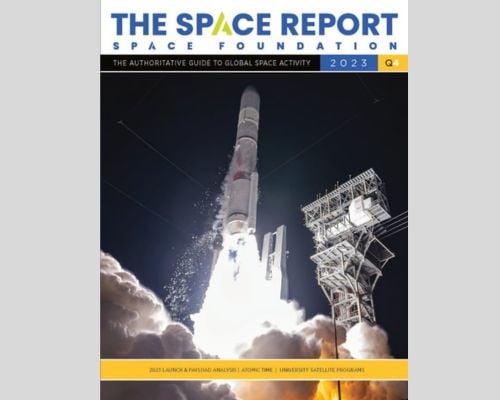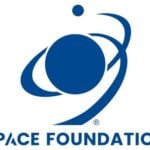Space Foundation Press Releases
The Space Report 2023 Q4 Shows Record Number of Launches for Third Year in a Row, Technological Firsts, and Heightened Focus on Policy
Written by: Space Foundation Editorial Team

- U.S. launch attempts increased by 33%
- Commercial launch activity grew 50% year-over-year
- Satellite deployment grew 23% year-over-year
- 14 new launch vehicles set to launch in 2024
COLORADO SPRINGS, Colo. — Jan. 23, 2024 — Space Foundation, a nonprofit organization founded in 1983, offering information, education and collaboration for the global space ecosystem, today released The Space Report 2023 Q4, which shows the busiest year ever for space.
Global launch activity reached new highs for the third year in a row, with 223 launch attempts and 212 successful launches. Commercial launch activity increased 50% from 2022. The United States saw a 33% increase in launch attempts, with China, India and Japan also logging more activity. Payload activity saw similar volume increases. More than 2,800 satellites deployed into orbit, 23% more than in 2022. This total set a record for the most payloads ever deployed in a year; however, the percentage growth slowed slightly from 2022, where the number of satellites grew 36%. The commercial sector by far dominated in terms of payload numbers: 90%, or 2,507 of the known satellites deployed, were commercial, versus 186 civil government spacecraft and 98 military satellites. SpaceX deployments drove the majority of commercial payloads, accounting for 79% of deployments in that sector.
The growing commercial sector has led to a strong demand for new launch vehicles, with 14 expected to make maiden flights in 2024. Some of the new launch vehicles stem from big players including United Launch Alliance and Arianespace, but most come from small startups, including firms building the first orbital launchers for Australia and Argentina.
The Q4 edition shines a spotlight on Japan’s space presence and ambitions. The nation is capitalizing on new opportunities in the public and private sectors, with government budget increases and industry investment. With this funding, Japan is hoping to double the size of its domestic space market from roughly $27 billion to $54 billion by the early 2030s. However, it also risks losing its independent access to space as it faces launch vehicle failures and delays.
Despite 2023’s records, some indicators show slight cooling of the space economy. Mergers and acquisitions for space-related firms slowed in the fourth quarter of 2023, according to analysis by Quilty Analytics. Additionally, the S-Network Space Index, which tracks a global portfolio of publicly traded companies that are active in space-related businesses, underperformed other benchmark indexes, declining 2.9% in 2023. But Q4 did bring good news for some space firms with an uptick in equity financing deals, a crucial lifeline for capital-intensive space startups.
The Q4 edition also examines workforce and technology issues, including the rise of university satellite programs. Around the world, the number of universities with student satellite opportunities is rapidly increasing. While many of these projects are mostly educational, others are conducting critical research. For some countries, a university satellite is their space presence.
The surge in satellite deployments drove concern for astronomers around the world as objects in low Earth orbit are increasingly interfering with space observations. This has led to several workshops and conversations between astronomical groups and satellite operators, which led to novel techniques to reduce the brightness of satellites orbiting overhead.
The Q4 edition also examines the delicate world of time measurement in space. Satellites provide the signals for everything from Global Positioning System (GPS) to online banking to mobile phones, but if satellites fall out of sync, entire global systems can be thrown into disarray. The leap second was developed to make up for these slight changes. But now, the International Telecommunication Union and technology companies are calling for the removal of leap seconds, resulting in arguments on how to keep time in an increasingly complex world.
As the busiest year in the history of space wound down, The Space Report asked key space leaders to share what they foresee for 2024, with opportunities and challenges in a new year that appears poised to shatter 2023’s records.
About The Space Report
The Space Report, published by Space Foundation since 2006, is the authoritative report on the global space ecosystem, covering space exploration and space-to-Earth industries. Available on a subscription basis, The Space Report provides policy analysts, congressional staff, investors, media, and space industry newcomers with research and insight on a quarterly basis. Highlighting each report is an overview of the latest data available on the space economy, space infrastructure, and other key industry indicators as well as analysis of commercial, government and educational events impacting business, workforce and our daily lives.
About Symposium 365
Symposium 365 is the premier source for information and events in the global space ecosystem, offering authoritative news and insight as well as opportunities for networking and conducting business via Space Symposium and The Space Report. Serving commercial, government and education sectors, programs and resources are delivered in-person and online around the globe.
About Space Foundation
Space Foundation is a nonprofit organization founded in 1983, offering information, education and collaboration for the global space ecosystem. Driven by partnerships, Space Foundation unites the entire spectrum of stakeholders — business, government, education and local communities — through support from corporate members, sponsors, fundraising and grants. Visit Space Foundation at www.SpaceFoundation.org, and follow us on Facebook, X, Instagram, LinkedIn and YouTube.
###
All brand names and product names are trademarks or registered trademarks of their respective companies.
Tags: Space Foundation, The Space Report, Symposium 365, space launch, space technology, space innovation, space ecosystem, space advocate, space commerce, space exploration, satellites, space spending, commercial space, space defense
Media Contacts:
Rich Cooper
Vice President, Strategic Communications & Outreach
Space Foundation
(202) 596-0714
[email protected]
Dottie O’Rourke
TECHMarket Communications
(650) 344-1260
[email protected]

